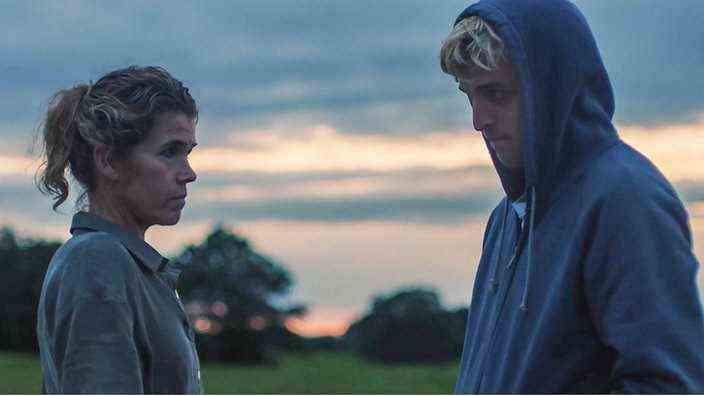When children grow up, they turn into aliens for their parents. In people who, with all their love, have become strange, strange, maybe even unsympathetic. In this sense, the relationship between Jason (Jonas Dassler) and Marlene (Anke Engelke) is completely normal: Jason’s blonde-dyed hair ends shaggy, the hairstyle has become isolation. He wants to have as little as possible to do with his overprotective mother. Jason loves freedom and is looking for a kick, on the skateboard and in the nightlife. Caution? Is for old people. After a night at the club, he hangs out drunk on a truck. And ends up, seriously injured, in the hospital and again in the care of Marlene.
The way Anke Engelke appears in the role of mother in the hospital, a small, fragile-looking person who has grief in a tortured face, makes it immediately clear what a great character actress the actress who has become known as a comedian is. Your first sentence to the treating physician applies not Jason’s health: “Was he actually drunk?”, She wants to know. For her, Jason’s recklessness is a betrayal of her motherliness.
“My son” is above all Marlene’s film, and one would just like to cheer that there is such a film in the cinema now: with a woman over fifty in the lead role (who is not Meryl Streep), whose character does not point to a late love affair or the (solvable) problems of getting older is focused. Rather, it can be quite complex – Marlene is the mother, photographer and life and love partner of a mostly absent film man.
The seriousness with which Lena Stahl, who also wrote the screenplay, explores the topic of “motherhood” in her debut feature film is nice. In these times when children are the most meaningful thing that most people can think of, the kitsch-free, also disillusioned look from “My Son” is just right.
A mother’s grief: Anke Engelke as Marlene on her son’s bedside.
(Photo: Warner Bro)
Because Jason is not allowed to fly after his injury, Marlene drives him from Berlin to a rehabilitation clinic in Switzerland in her old Volvo. An unmoved, constructed pretext, like in various similarly knitted road movies, to send the characters who have become strangers to each other on a relationship journey. The great Jonas Dassler, who played the woman killer monster Fritz Honka in Fatih Akin’s “The Golden Glove”, embodies Jason as a blue-eyed child-man and is allowed to play out his abysmal young charm. What is going on in Jason’s head behind the curtain of his shaggy hair, the viewer knows just as little as Marlene. With his grin he keeps everyone at a distance. Even after his serious accident, he considers himself invulnerable, shows his wounds like trophies and apparently grins casually away at the consequences. He advises Marlene to analyze and control less and just tackle life – he makes a point. It’s great how wrinkled, fledged and depressed by her fears Anke Engelke plays Marlene. A lot of unlived life shines through. But isn’t she also right that it doesn’t work without a minimum of control, without reliable partnerships and loving care from others?
Jason feels great jumping off a high rock into the lake. Marlene took the much bigger leap
The staged is excitingly calm, the film concentrates entirely on the encounters and evasive movements of mother and son – a road movie like a chamber play. The film doesn’t take either Jason’s or Marlene’s side. Because Anke Engelke and Jonas Dassler are also equal partners in terms of acting, the struggle between them is exciting. On their trip, the two meet Jonas’ former babysitter (Hannah Herzsprung), who lives in a rural community that has dropped out, and a father-daughter couple in a coolly styled villa. These travel stations represent, a little too schematically, contrary life plans: How much life control makes sense – and is it possible at all? Is it, for example, wise to give birth to a baby in a home birth in the country, where the nearest neonatology department is out of reach in an emergency?
In addition, the viewer learns why Jonas’ and Marlene’s relationship is not as “normal” as initially thought. Why Marlene, who as a photographer had an offer to move to a famous agency in New York, never got there. Jason feels great and alive when he jumps off a high rock into a lake. Marlene has long since dared to take the bigger leap – but it made her fearful and hyper-caring.
There are events in life, after which it will never be the same again. Take motherhood, for example.
my son, D 2021 – Director, book: Lena Stahl. Camera: Friede Clausz. Editor: Barbara Gies. Music: Angela Aux, Cico Beck & Nicolas Sierig. With: Anke Engelke, Jonas Dassler, Hannah Herzsprung. Distributor: Warner Bros., 87 minutes.

